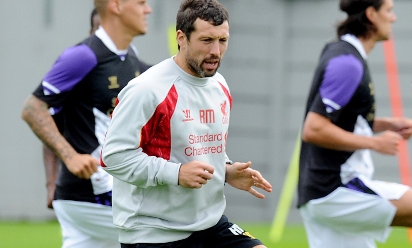'How LFC will benefit from Gatorade'
Liverpool today announced that Gatorade will be their new official sports nutrition partner - and the news has been welcomed by the club's head of fitness and conditioning, Ryland Morgans.
Morgans arrived at Anfield in October 2012 from Swansea, and the Welshman has earned praise from all quarters for the way he has prepared the players throughout pre-season this year.
He explained to Liverpoolfc.com why the new partnership with Gatorade is an important advance and one that will help further improve performance on the pitch.
"There's a whole host of benefits," explained Morgans. "But it's mainly for the drinks that we will use during training and in matches.
"It will help us provide players with a form of hydration, such as a fluid, which would ultimately be water. Then within those drinks, there's a range of different types of carbohydrates such as glucose being in sugar form, which is a major energy source for players when they are training and playing.
"It will also have an element of electrolytes, such as sodium, potassium and magnesium and that will help players prevent cramps and minimise the risk of fatigue."
Almost 12 months after joining the club, Morgans is relishing working with the Liverpool first-team squad. But what exactly does his role at Melwood entail?
He explained: "My responsibility is to cover all the fitness and conditioning of the players and the monitoring of those fitness elements, whether that's based on the grass, whether it's based in the gym for injury prevention work, strength and power development.
"Then we look at how quickly we can get players to recover in between sessions on grass or in the gym and more importantly in between matches.
"Then we'll look at a nutritional strategy for an individual player to support their recovery or performance.
"A typical day for me would be like this. First thing in the morning we will have a medical meeting to run through the previous day's training, or if it's the first day in after a match, the physical conditioning elements of what the match entailed for each individual player.
"That would then be supported heavily by the medical staff in terms of if the player has any medical issues. We'll then go into a management meeting with the manager and the coaches, and we'll talk through the specific elements for the training throughout that day. Then we'll be out on the grass.
"We're out at Melwood five or six times a week and we'll use all three pitches and the surrounding areas while we're training in any one session."
Steven Gerrard was so impressed with Morgans' pre-season regime that he went on record to describe his sessions as 'brutal'.
"When I found out about that, I sent him a text to say thank-you," said Morgans. "Coming from a player like that, I think it is testament to the work he has completed as part of the group.
"And ultimately I'm just there to support them and make sure they are as fit as possibly can be to perform in the Premier League."
The demands of the Premier League are constantly evolving - and Morgans needs to make sure Liverpool's players are not left behind.
"I think the speed of the game has increased over the last 15-20 years," he admitted. "So therefore there is a greater physical demand placed upon players in matches.
"That's pretty much based around how managers set their teams up in terms of systems and styles of play and then how players perform within those roles.
"So the physical demands of that have increased certainly over the last few years and therefore there is a greater emphasis on physical fitness underpinned by sports science.
"In yesteryear, I suppose, it was a case of beans on toast and scrambled egg on toast, but players now will have their own individual preferences and we have a part-time nutrition consultant who comes in one day a week and I'll liaise with him and we can devise an individual strategy for players.
"With the amount of games we play, there's not only a significant need for the player to recover between matches but to be able to recover between high intensity bouts within a match or within a training session.
"We have a pool area. So when players have completed a high-intensity training sessions, they'll be in here for about a 10 or 15 minute window, where the boys will look to improve their recovery. And as much as it looks like just a standard swimming pool, we don't tend to use it for that unfortunately."



